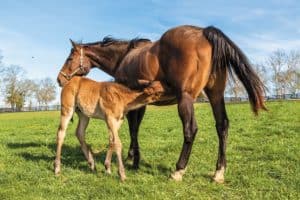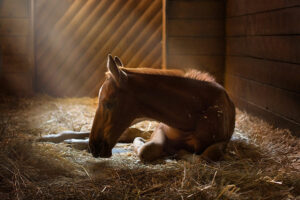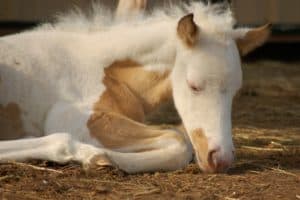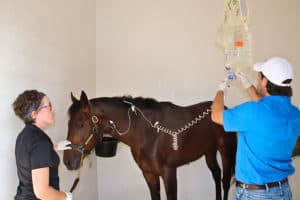
Young Horse Digestive Health
Understanding how your growing foal’s digestive system works can help you recognize and avoid potential problems.

Understanding how your growing foal’s digestive system works can help you recognize and avoid potential problems.

Time is life for a foal. Here’s a look at the top causes of illness in newborn foals and how to manage a sick foal.

An equine internist explains how she makes testing decisions and interprets results.

Rotaviral diarrhea is a life-threatening disease that usually affects foals younger than 6 months.

Signs and tests that can help you and your veterinarian quickly identify the various causes of foal diarrhea.

Disease control focuses on prevention through increased biosecurity protocols.

Rhodococcus equi can cause significant economic losses, but researchers are still working to understand how and why it develops and how to prevent it.

The workshop will be in-person and also livestreamed for virtual attendance. It is free to attend.

Horse manure is rich not only in energy and soil-building nutrients, but also information about your horse’s health and well-being. In this article, veterinarians offer guidelines to help you better “read” your horse’s poop.

Efforts are underway to determine the role of the virus in a current outbreak of diarrheal disease in Central Kentucky foals.

Give your new foal the best chance for a healthy start to life by understanding the red flags—and the green lights—of neonatal health.

Dr. Nathan Slovis covers new technologies in accurately diagnosing the causes of infectious diarrhea in foals.

Newborn foals are easy targets for every kind of bacterium, virus, and other pathogenic organism. Here are some steps you can take to maximize your foal’s immunity from gestation to weaning.

Rhodococcus equi is the most serious cause of pneumonia in 1- to 4-month-old foals. Learn more about this potentially deadly pathogen and how to protect your foals with these resources on TheHorse.com.

While some types of diarrhea in horses present little to worry about if watched carefully, others can be life-threatening. Read more about this condition’s causes, diagnosis, and treatment.

Orphan foals raised with a correct balance of nutrients and monitored for growth, food consumption, and weight gain can be every bit as tall, strong, and athletic as foals raised by their dams.
Stay on top of the most recent Horse Health news with
© 2022 Copyright Statement dolor sit amet, consetetur sadipscing User Terms, sed diam nonumy eirmod tempor invidunt ut labore et dolore magna aliquyam erat, sed diam voluptua. At vero eos et accusam et justo duo dolores et ea rebum. Stet clita kasd gubergren, no sea takimata sanctus est Lorem ipsum dolor sit amet.
"*" indicates required fields